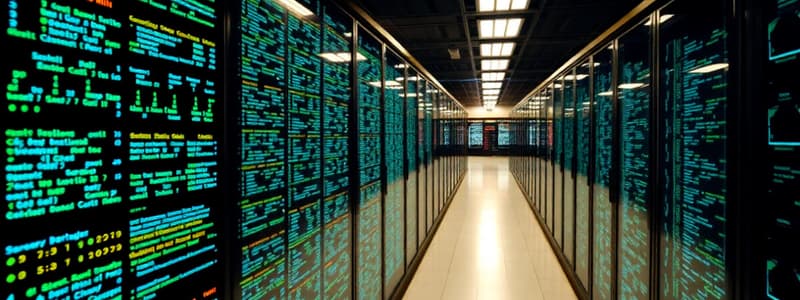Podcast
Questions and Answers
Which computer first utilized vacuum tubes?
Which computer first utilized vacuum tubes?
- Intel 4004
- PDP 8
- IBM 7090
- ENIAC (correct)
What was a key feature of computers in the third generation?
What was a key feature of computers in the third generation?
- Dependence on punched cards
- No multitasking capability
- Use of vacuum tubes
- Invention of Integrated Circuits (correct)
Which limitation did first-generation computers notably have?
Which limitation did first-generation computers notably have?
- Integration of microprocessors
- Ability to perform complex calculations
- Size and overheating issues (correct)
- High efficiency with minimal heat generation
What significant advancement characterized the fourth generation of computers?
What significant advancement characterized the fourth generation of computers?
Which computer was primarily used for developing weather forecasting models?
Which computer was primarily used for developing weather forecasting models?
What limitation did early personal computers have during the fourth generation?
What limitation did early personal computers have during the fourth generation?
Which characteristic was common among second-generation computers?
Which characteristic was common among second-generation computers?
What feature of third-generation computers facilitated programming for non-experts?
What feature of third-generation computers facilitated programming for non-experts?
Which type of software is responsible for managing the computer's hardware?
Which type of software is responsible for managing the computer's hardware?
What is the primary function of the Central Processing Unit (CPU)?
What is the primary function of the Central Processing Unit (CPU)?
Which of the following is NOT an input device?
Which of the following is NOT an input device?
What role does a Network Interface Card (NIC) play in a computer system?
What role does a Network Interface Card (NIC) play in a computer system?
Which of the following is an example of utility software?
Which of the following is an example of utility software?
What technology enables global sharing and expression in terms of entertainment?
What technology enables global sharing and expression in terms of entertainment?
Which component stores data and instructions that the CPU needs to access frequently?
Which component stores data and instructions that the CPU needs to access frequently?
Which of the following poses a risk to online security?
Which of the following poses a risk to online security?
What is the primary purpose of processing in an information system?
What is the primary purpose of processing in an information system?
Which of the following best defines a closed system?
Which of the following best defines a closed system?
Which component of an information system includes hardware, software, data, and networks?
Which component of an information system includes hardware, software, data, and networks?
What is the role of people resources in an information system?
What is the role of people resources in an information system?
Which of the following best describes an open system?
Which of the following best describes an open system?
Which area of the framework focuses specifically on managing IT at different business levels?
Which area of the framework focuses specifically on managing IT at different business levels?
What are the main outputs of information processing activities in an information system?
What are the main outputs of information processing activities in an information system?
Which of the following is NOT a major area in the information systems framework?
Which of the following is NOT a major area in the information systems framework?
What defines fifth generation computing?
What defines fifth generation computing?
Which characteristic of software distinguishes it from hardware?
Which characteristic of software distinguishes it from hardware?
What was a primary feature of early software developed in the 1950s and 1960s?
What was a primary feature of early software developed in the 1950s and 1960s?
Which of the following is an example of early software during the 1950s?
Which of the following is an example of early software during the 1950s?
How did Unix influence computing in the 1970s?
How did Unix influence computing in the 1970s?
What dependency relationship exists between software and hardware?
What dependency relationship exists between software and hardware?
What is a notable limitation of early software development methods?
What is a notable limitation of early software development methods?
What defines the main function of supercomputers in the fifth generation?
What defines the main function of supercomputers in the fifth generation?
What is the primary goal of supply chain management?
What is the primary goal of supply chain management?
Which of the following is NOT a key feature of a Customer Relationship Management (CRM) system?
Which of the following is NOT a key feature of a Customer Relationship Management (CRM) system?
Which component is NOT part of organizational culture?
Which component is NOT part of organizational culture?
Which of the following best describes the function of Enterprise Resource Planning (ERP) software?
Which of the following best describes the function of Enterprise Resource Planning (ERP) software?
What can be a cause of organizational change?
What can be a cause of organizational change?
Which of the following best captures the relationship between organizational culture and change?
Which of the following best captures the relationship between organizational culture and change?
What aspect is crucial when managing a supply chain effectively?
What aspect is crucial when managing a supply chain effectively?
Which of the following best describes the components of organizational culture?
Which of the following best describes the components of organizational culture?
Flashcards are hidden until you start studying
Study Notes
Information Systems Concepts
- Information: Processed and interpreted data that creates value by organizing relationships.
- System: A group of components working together with inputs, processing, and outputs.
- Closed System: Does not interact with other systems.
- Open System: Interacts with other systems.
- Information Systems (IS): Combine people, hardware, software, communication networks, data resources, and policies to store, retrieve, transform, and distribute information within an organization.
Framework of Major Areas
- Focuses on:
- Foundation Concepts: Fundamental behaviors, technical business, and managerial concepts of IS.
- Information Technologies: Major concepts, developments, and management problems in IT.
- Business Applications: Major uses of IS for operations, management, and gaining competitive advantage.
- Development Process: Planning, developing, and implementing IS to meet business opportunities.
- Management Challenges: Effectively and ethically managing IT at the end-user, enterprise, and global business levels.
Components of Information Systems
- Five Components:
- People: End users and IS specialists.
- Hardware: Machines and media.
- Software: Programs and procedures.
- Data: Includes data and knowledge databases.
- Networks: Communication channels.
- Data resources: Transformed into information products for end users through information processing.
- Information Processing: Includes input, processing, output, storage, and control.
Computer Generations
- First Generation (1940s-1950s): Vacuum tubes, large and inefficient, basic arithmetic and logical operations.
- Examples: ENIAC, UNIVAC.
- Second Generation (1950s-1960s): Transistors replaced vacuum tubes, smaller, more efficient, and reliable.
- Examples: IBM 7090
- Third Generation (1960s-1970s): Integrated circuits (ICs) combined multiple transistors, leading to minicomputers and larger mainframes.
- Examples: DEC PDP 8.
- Fourth Generation (1970s-1990s): Microprocessors integrated onto a single chip.
- Examples: Intel 4004, Apple II, IBM PC, Commodore 64.
- Fifth Generation (1990s-Present): Advancements in artificial intelligence (AI), quantum computing, and supercomputers.
Software
- Non-tangible component of a computer system.
- Characteristics:
- Intangible: Cannot be physically touched.
- Modifiable: Can be updated or modified.
- Dependent on Hardware: Requires hardware to function.
History of Software Development
- Early Software (1950s-1960s): Single-purpose, hardware-dependent, and limited in storage and power.
- Examples: FORTRAN, assembly language.
- Rise of Operating Systems (1970s): Introduced multitasking and resource management.
- Examples: Unix.
- Personal Computing Era (1980s-Present): User-friendly interfaces, more complex software applications.
- Examples: Microsoft Windows, macOS.
Types of Computer Resources
Component of Computer Hardware
- Input Devices: Keyboard, mouse, scanner, microphone.
- Output Devices: Monitor, printer, speakers.
- Central Processing Unit (CPU): "Brain" of the computer.
- Memory: Stores data and instructions for access by the CPU.
- Storage Devices: Permanently store data. (Hard drives, solid-state drives)
- Network Interface Card (NIC): Enables internet connection.
- Motherboard: Main circuit board that connects all components.
- Power Supply Unit (PSU): Converts AC power to DC power for components.
Types of Software Resources
- System Software: Manages hardware and provides a platform for other software to run.
- Examples: Operating systems, device drivers, firmware.
- Application Software: Designed to perform specific tasks.
- Examples: Word processors, spreadsheets, web browsers, games, media players.
- Utility Software: Specialized tool for system maintenance and optimization.
- Examples: Antivirus software, disk cleaners, backup tools.
Network Infrastructure
- Refers to the hardware and software that enable connectivity and communication between users, devices, apps, the internet, and more.
Supply Chain Management
- Strategic Coordination: Integration of business functions within an organization and its entire supply chain to optimize supply and demand management.
- Focus: Matching supply and demand as effectively and efficiently as possible.
- Key Issues: Outsourcing, procurement, managing suppliers and customer relationships, problem identification, and response.
Enterprise Resource Planning (ERP)
- Software that integrates business components, including supply chain processes, by sharing information and data among supply chain members.
Customer Relationship Management (CRM)
- Practices, strategies, and technologies to manage and analyze customer interactions and data across the customer lifecycle.
- Key features:
- Contact management
- Sales management
- Analysis
- Marketing automation
- Customer support
- Import contact data
- Smartphone access
- Social networking
Organizational Culture
- Major understandings and assumptions for an organization.
- Often unwritten, including values, norms, behaviors, and decision-making approaches.
- Key Components:
- Values
- Norms
- Behaviors
Organizational Change
- Handling planned and unplanned change in organizations.
- Change can be initiated by internal or external factors.
- Internal: Employees at all levels.
- External: Competitors, federal and state laws, community regulations, natural occurrences, economic conditions.
Organizational Culture and Change
- Organizational culture influences how change is perceived, accepted, and implemented.
Studying That Suits You
Use AI to generate personalized quizzes and flashcards to suit your learning preferences.



